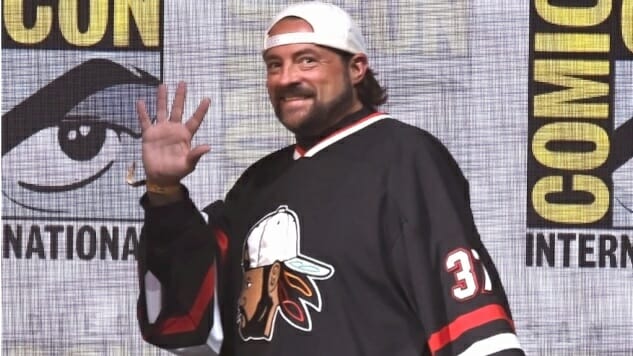Clerks (and Kevin Smith’s Career) Turns 25
A quarter century with the chronicler of Gen X geek culture
Photo Courtesy of Kevin Winter/Getty Images
Full disclosure: When I sported a goatee, people kept telling me I was a Kevin Smith lookalike. I promise that hasn’t colored my current attitude toward him. I think the reason it offended me so damn much at the time was that I (unjustly) hated his films with the kind of unnecessary fervor reserved for stuff that you used to like but then grew up and found intellectual reasons to dislike. This is deeply ironic for the precise reason that Smith, in 25 years of filmmaking, writing and commentary that has seen him go from an indie outsider to an influential gatekeeper of popular culture, hasn’t let it turn him into a snob. His brand is that he’s not a snob.
Generation X Wasn’t Even Supposed to Be Here Today.

Having been born in the pitiless December of 1983, I exist at the inflection point between Gen X and Millennial, and have had a sort of front row seat for our shared frustration with the world passed to us by the Baby Boomers. The year Smith’s debut Clerks hit theaters, 1994, couldn’t have been a better stand-in for the crappiness of that time if everybody involved had stage managed it to be so. The “Republican Revolution” of 1994 saw a massive red wave hit Congress, making Newt Gingrich and Rush Limbaugh the sudden arbiters of “civil discourse.” The deindustrialization of the country was well underway, and service jobs were becoming a larger share of the economy. The future seemed boring and square and run by the uncle who docked your pay because you missed a patch of grass over by his hedges. We had long ago stopped building or making things and everybody was a sellout.
That hopelessness pervades Clerks. For the teen set—because this was back when teens worked the shitty jobs lampooned in the movie, instead of the single mothers of today—it was a perfect expression of the injustice of retail. It follows Dante Hicks (Brian O’Halloran), who is called in to his dead-end, grueling, meaningless job at a convenience store, slogging through the boredom of the day by bitching about his feckless, stupid customers with his misbehaved friend and fellow retail slave, Randal Graves (Jeff Anderson).
I was introduced to Clerks by my coworkers at Blockbuster, which was a whole chapter of my life. The movie got its hooks into me immediately. I have no difficulty understanding why it caught on so hard. It was sincere, it spoke the language of the people to whom it was trying to speak, and it highlighted an unbearable side of life in a way that made it funny and gave a beleaguered register clerk a vocabulary to deal with that frustration. Over and over again, Dante whines, “I wasn’t even supposed to be here today!”
None of us were supposed to be there, and that’s what elevated the affection toward the movie into something resembling kinship with it in the minds of a generation.
Watching it again in later years, it loses some of its luster, even considering Smith made it for essentially no money, using actors he knew personally and filming in black and white for the simple reason that he couldn’t find sufficient, evenly colored lighting. A lot of it (like Tarantino or Whedon or Sorkin joints) is centered around dialogue that is way too pleased with how clever it is. It’s disjointed and sort of lacks a clear payoff or stopping point—though you can argue that this is an artistic trick that highlights the nature of bullshit retail work, which ends at a prescribed time rather than when you complete any particular task. (I don’t argue this—the thing kind of meanders.)
Then again, it also gave us “Berserker,” a song responsible for two decades’ worth of me professing my affection through freight vehicle-related simile.
A Universe Askew
Smith seemed to me, almost overnight, to have become a celebrity. Inducted into indie darling-hood by Harvey and Bob Weinstein’s Miramax (and we’ll get to that), Smith made a sort of instantaneous transformation from a struggling shoe-stringer to a moneyed hotshot director. Having been handed his golden ticket, he set about making more movies in his “Askewniverse,” (so named for his company, View Askew), all of which starred friend Jason Mewes and himself as Jay and Silent Bob.
-

-

-

-

-

-

-

-

-

-

-

-

-

-

-

-

-

-

-

-

-

-

-

-

-

-

-

-

-

-

-

-

-

-

-

-

-

-

-

-








































